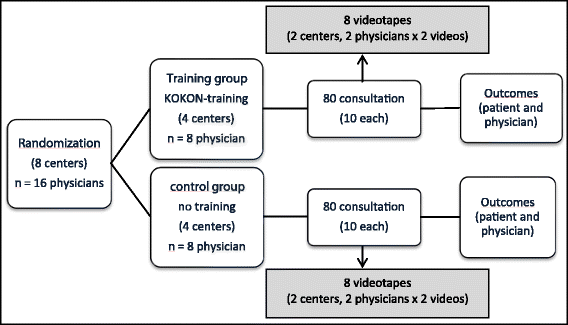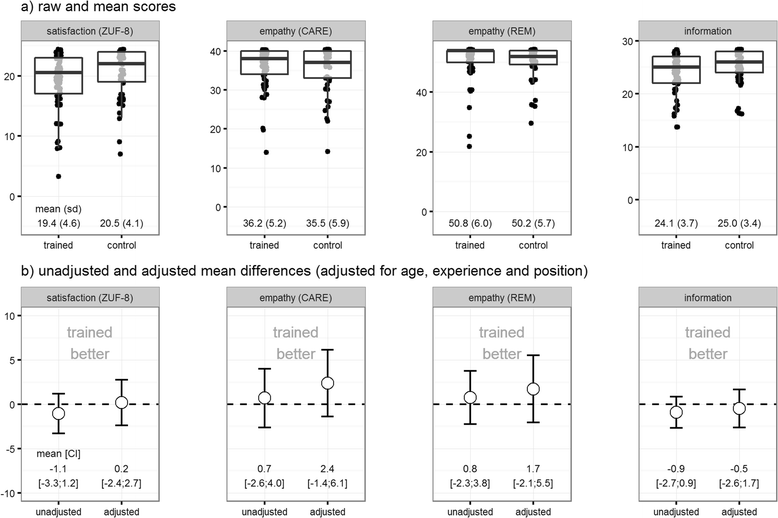A consultation training program for physicians for communication about complementary medicine with breast cancer patients: a prospective, multi-center, cluster-randomized, mixed-method pilot study
- PMID: 27809814
- PMCID: PMC5096286
- DOI: 10.1186/s12885-016-2884-y
A consultation training program for physicians for communication about complementary medicine with breast cancer patients: a prospective, multi-center, cluster-randomized, mixed-method pilot study
Abstract
Background: The aim was to develop and evaluate a training program for physicians for communicating with breast cancer patients about complementary medicine (CM).
Methods: In a cluster-randomized pilot trial eight breast cancer centers (two physicians per center) were randomized to either a complementary communication training program (9 h e-learning + 20 h on-site skills training) or to a control group without training. Each physician was asked to consult ten patients for whom he or she is not the physician in charge. We used mixed methods: Quantitative outcomes included physicians' assessments (empathy, complexity of consultation, knowledge transfer) and patients' assessments (satisfaction, empathy, knowledge transfer). For qualitative analyses, 15 (eight in the training and seven in the control group) videotaped consultations were analyzed based on grounded theory, and separate focus groups with the physicians of both groups were conducted.
Results: A total of 137 patients were included. Although cluster-randomized, physicians in the two groups differed. Those in the training group were younger (33.4 ± 8.9 vs. 40.0 ± 8.5 years) and had less work experience (5.4 ± 8.9 vs. 11.1 ± 7.4 years). Patient satisfaction with the CM consultation was relatively high on a scale from 0 to 24 and was comparable in the two groups (training group: 19.4 ± 4.6; control group 20.5 ± 4.1). The qualitative findings showed that physicians structured majority of consultations as taught during the training. Comparing only the younger and less CM experienced physicians, those trained in CM communication felt more confident discussing CM-related topics than those without training.
Conclusion: A CM communication-training program might be especially beneficial for physicians with less consulting experience when communicating about CM-related issues. A larger trial using more suitable quantitative outcomes needs to confirm this.
Trial registration: ClinicalTrials.gov: NCT02223091 , date of registration: 7 February 2014.
Keywords: Breast cancer; Communication; Complementary and integrative medicine.
Figures
References
-
- Baum M, Cassileth BR, Daniel R, Ernst E, Filshie J, Nagel GA, Horneber M, Kohn M, Lejeune S, Maher J, et al. The role of complementary and alternative medicine in the management of early breast cancer: recommendations of the European Society of Mastology (EUSOMA) Eur J Cancer. 2006;42(12):1711–1714. doi: 10.1016/j.ejca.2006.02.019. - DOI - PubMed
-
- Greenlee H, Balneaves LG, Carlson LE, Cohen M, Deng G, Hershman D, Mumber M, Perlmutter J, Seely D, Sen A, et al. Clinical practice guidelines on the use of integrative therapies as supportive care in patients treated for breast cancer. J Natl Cancer Inst Monogr. 2014;2014(50):346–358. doi: 10.1093/jncimonographs/lgu041. - DOI - PMC - PubMed
-
- Oskay-Ozcelik G, Lehmacher W, Konsgen D, Christ H, Kaufmann M, Lichtenegger W, Bamberg M, Wallwiener D, Overkamp F, Diedrich K, et al. Breast cancer patients’ expectations in respect of the physician-patient relationship and treatment management results of a survey of 617 patients. Ann Oncol. 2007;18(3):479–484. doi: 10.1093/annonc/mdl456. - DOI - PubMed
Publication types
MeSH terms
Associated data
LinkOut - more resources
Full Text Sources
Other Literature Sources
Medical



